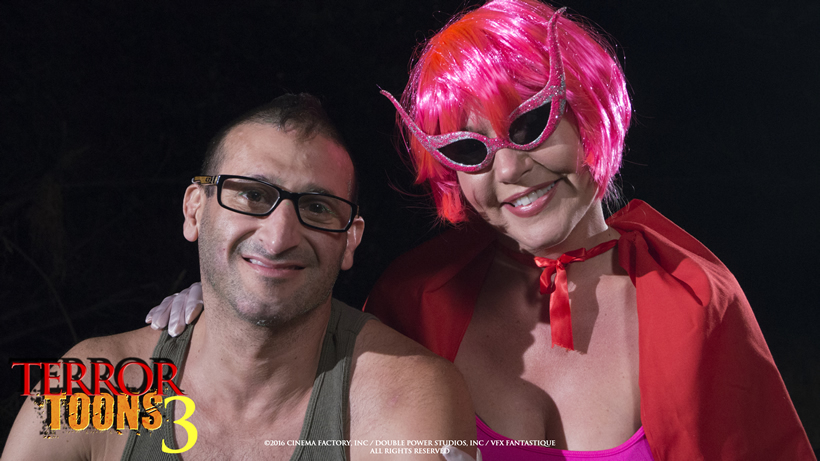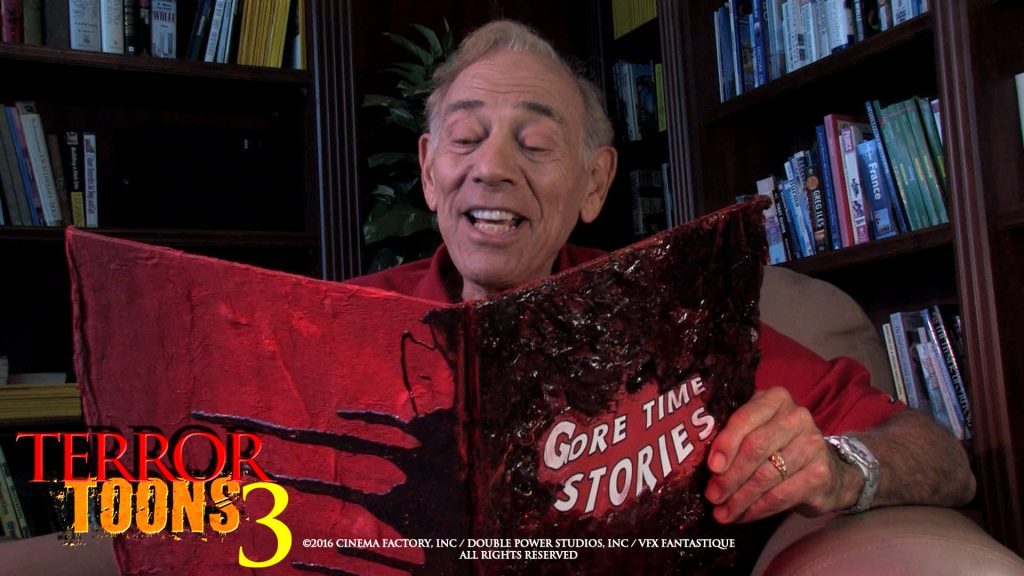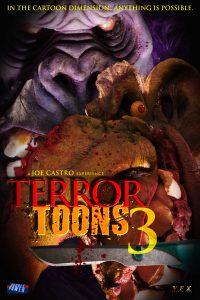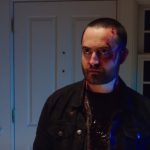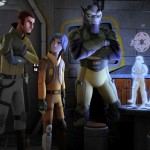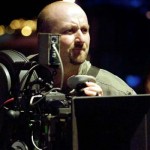Joe Castro is an independent filmmaker/special effects artist who has been working in the industry for over 20 years. His credits includes special effects work on films such as Night of the Demons 3, William Lustig's Uncle Sam and Herschell Gordon Lewis' Blood Feast 2. His own films beyond the Terror Toons saga include titles such as Ceremony, The Hazing and The Summer of Massacre.
Arriving on iTunes and VOD this weekend is Terror Toons 3, the third installment in filmmaker Joe Castro's madcap gory trilogy. The first film in the series, Terror Toons, took the violent nature of classic Warner Bros. cartoons to their natural gory conclusion. The second, Terror Toons 2, drew a lot of its inspiration from fairy tales. This latest installment combines both. The film begins with a segment picking up where Terror Toons left off, seeing the resurrection of murderous cartoon villains Dr. Carnage and Max Assassin. It then segues into an interconnected series of updated fairy tales narrated by none other than the Godfather of Gore himself, Herschell Gordon Lewis!
Mr. Castro was kind enough to speak to me recently about his latest indie horror opus …
Daniel Baldwin: This was actually the first film of yours that I have seen. I sadly wasn't able to catch up with Terror Toons or Terror Toons 2 before I sat down to watch it, so I actually really appreciated the recap that you had at the start of the film.
Joe Castro: Oh, did that recap help you? Was it clear enough for you to be able to enjoy the rest of the premise of Dr. Carnage and Max Assassin?
DB: Yes, it did. It very much worked, and I wasn't lost at all.
JC: Okay, good! Thank you! Good, because I was always concerned that it wouldn't be a standalone film without watching the first one, so I'm glad to hear you say that.
DB: What are you biggest influences as a filmmaker, both for Terror Toons 3 and just in general?
JC: I always refer to my top five films of all-time and those would include the filmmakers, as well as the films themselves. All of the technical aspects as well, like the special effects artists that helped create those films. David Cronenberg is right at the top of the list, with his movie Rabid. Marilyn Chambers starred and Joe Blasco did the make-up effects for that film. It was very innovative, very different and very new. Then Lucio Fulci's The Gates of Hell [aka The Beyond]. You know, any Italian horror film really. Sergio Stivaletti did the special effects on that one.
Godzilla vs. the Smog Monster [aka Godzilla vs. Hedorah], which was actually the very first movie I saw by myself at home alone, on a Saturday afternoon creature feature special. It's actually the film responsible for getting me into motion pictures and creating special effects. Of course Blood Feast, Herschell Gordon Lewis' original splatter epic. The man wrote, directed, created all of the special effects, composed the music, cast the movie and shot the movie himself. He literally made the movie with his own two hands. Then, finally, the original Poltergeist that Tobe Hooper directed, with Steven Spielberg as the producer. That movie, I saw it 12 times in the movie theater when it was first released. It had a major influence on my career in special effects and filmmaking.
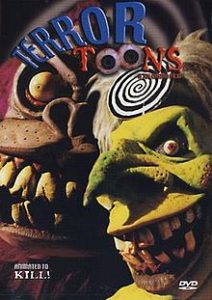 DB: That's a pretty wide variety of genre influences, but they're all great films. Smog Monster in particular made me grin. Both of my kids and me are huge Godzilla fans.
DB: That's a pretty wide variety of genre influences, but they're all great films. Smog Monster in particular made me grin. Both of my kids and me are huge Godzilla fans.
JC: Godzilla is great. Those films are very family-friendly, purely for fun. The franchise is just all about having fun. They don't take themselves so seriously, and they always deliver the goods. You can't ask for more than that when you're watching a science fiction horror movie.
DB: They're also very imaginative and I can see that connection within your film itself. The sense of fun and imagination permeating it all. And, of course, you brought up Herschell Gordon Lewis and you have a similar hand-crafted nature to your work here.
JC: Absolutely. That man, he's just a genius. If you've ever been around him, he's so much fun to be around and constantly sharing information. He wants to share his knowledge with you and then working with him on set, he has an intention for everything that he's doing. Even at the budget and scale of everything he's produced, he's invested in pure entertainment value and trying to make something that moves the world around him. He's great at what he does, he really is.
DB: Was it Blood Feast 2 where you first connected with him?
JC: That's correct. The job was cast to me when a larger company wasn't about to make it out to Louisiana where the movie was being shot. It was passed over to me and I got the opportunity to work on the sequel to the original slasher/splatter movie ever. I think within 10 minutes after arriving on set after getting in from the airport, Herschell and I just hit it off. Somebody was supposed to be stuck with a knife and it was supposed to be protruding out of the skull. I said, "How big of a knife sticking out of her?" He said, "Well, what do we have?" I turned to him and said, "Whatever you envision, that's what we have." He then knew immediately that we were going to work well together.
DB: He looked like he was having a lot of fun during his scenes as an actor.
JC: He has a screen presence all his own. He steals the show whenever he's in the room, wherever he is. He's such an animated character and he's all about providing entertainment and trying to make the world around him a better place. I can honestly say that I kinda felt like I was lost in the world of filmmaking until I met Herschell. He pointed me in the right direction.
DB: That's nice to hear. Of course you brought up him being an animated person. Obviously there's a lot of cartoon and fairy tale influences in Terror Toons.
JC: One of the best examples of cartoon entertainment is that anything is possible in the cartoon dimension. I was thinking about what films I would like to make in my lifetime. As filmmakers, there comes a point where we realize that we don't have all the time on this planet to make the films we want to make.
It occurred to me that it would be great venue to do a big mash-up of all of your ideas and it would be acceptable, completely acceptable. It would be appropriate and people would freely give their attention and their believability in reality, they'd completely put it aside and be entertained. That's what I appreciate in cartoons. Growing up as a kid, you look back at the Bugs Bunny cartoons. The Bugs Bunny/Warner Bros. stuff I grew up with had a very violent nature to it.
DB: Oh, I definitely agree!
JC: They have a funny and very violent nature that I guess stayed with me, and I've carried over into this kind of a cult genre of killer cartoons. The animated, dark, sinister world of Terror Toons.
DB: It's like this absurdist anthology and the madcap nature of it blends everything together, flowing from start to finish.
JC: That's good to hear. I'm glad you think that, because I take that as a complete complement.
DB: As a do-it-yourself filmmaker with decades of experience in special effects and directing, what excites you about the industry today?
JC: What excites me about the industry today? That's a great question. I think that the concept and idea anyone who is a filmmaker can now become their own distributors of their entertainment in a very worldwide way quickly and independently, without the influence of others. This is kind of a business aspect, but as artists, our forte isn't business. Our forte is creation, and I think this whole idea of being able to put our movies out in the world safely and then reap the benefits of our art form without being robbed by distributors is good. It's a good new aspect to the world of independent filmmaking. I always tell budding filmmakers that persistency is one of the greatest powers of mankind. If you continue to do it, it's a karmic fact that it will eventually work out and you'll tame the beast.
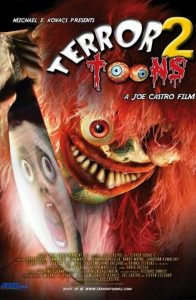 DB: I'm sure it's nice for your films to be out rather quickly too, instead of them sitting on a shelf forever, waiting for a distributor to release them.
DB: I'm sure it's nice for your films to be out rather quickly too, instead of them sitting on a shelf forever, waiting for a distributor to release them.
JC: Exactly. And then also, I think most filmmakers who put their films out themselves are targeting the correct audience; being true to the poster and whatnot. Sometimes it's so difficult for an independent filmmaker to distribute a film. It can be very frustrating. I have 17 films out, and I try to share the knowledge I have about distribution with new upcoming filmmakers that have produced their own films.
It's funny, when you use the word filmmaker …. people ask me what I do and I say "I'm a filmmaker." Many people don't actually understand that word. People understand producer. People understand director. People understand writer. People don't understand the word filmmaker. Filmmaker is obviously someone who makes the entire film themselves and owns their film. It's a dog eat dog world out there, but once again, if you keep at it, persistency is very powerful.
DB: Of that I'm sure. It takes a lot of work just to make a film, let alone distribute it yourself.
JC: Absolutely.
DB: What do you have coming up next that you'd like to talk about?
JC: Well, right now, we are in post-production for Terror Toons 4! It will be Brinke Stevens' directorial debut. Brinke, the Scream Queen, actually wrote, directed and stars in a large portion of the film. It's a script she wrote titled Personal Demons. Debbie Rochon also stars in it, as well as Bill Butler and Linnea Quigley. Like I said, we're in post-production for this film, and I'm sure they'll be at least another six to eight months of post-production and special effects photography. I hope to have it out by the end of 2017.
DB: That's cool. Of course you have a lot of effects going on in Terror Toons 3, so I imagine all of that probably takes a lot of time and effort to do, taking up a large portion of your post time.
JC: I think the reason why it takes up such a large portion of it … you know, we spent almost a year working on special effects photography for Terror Toons 3. Mainly because we were doing things that we had never done before, like making a monster suit to chase people, and it was just Steven — my producing partner of 19 years — and I. Just the two of us doing all of it in our homegrown studio that we built. Principal photography was just a short amount of days, but it took almost a year to finish all of the special effects shots.
DB: The passion definitely shows and homegrown filmmaking, do-it-yourself stuff, always has a certain charm to it that other films lack, even if they're great. All of the filmmakers you mentioned, as much as I love some of their bigger films, I always have a special admiration for their earliest work primarily because a lot of it has that homemade feel to it. The handcrafted nature of it always manages to capture my eye.
JC: Yes, I agree completely.
DB: I hope you have a nice day! Thank you for taking the time to speak to me about your film.
JC: Thank you so much, sir! Take care!

